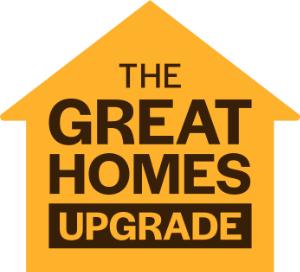Q and A: The #GreatHomesUpgrade

We are facing a moment of intersecting crises, with the war in Ukraine, the cost of living crisis and climate breakdown exacerbating the effects of each other. But this moment also poses the possibility of tackling fuel poverty, energy price spikes and carbon emissions at the same time. The Great Homes Upgrade is a campaign to change the way the UK’s housing stock is heated and powered, and if implemented would reduce our reliance on fossil fuels, provide decent housing for millions and speed up the transition to a sustainable society.
Rosh Lal, our movement builder, spoke to Aydin Dikerdem, organiser for the New Economics Foundation, about the new campaign.
Rosh: Thanks for talking to us Aydin. My first question is, what is the Great Homes Upgrade?
Aydin: The Great Homes Upgrade is a campaign by the New Economics Foundation to build popular demand and awareness about the huge array of benefits that would come from a national programme of retrofitting our homes. Retrofitting is quite a technical term but what we mean is the process of installing new features in a building which has already been built. So for instance we can make housing more energy efficient through things like better insulation and double- or triple-glazed windows. Second, we can replace dirty fossil-fuel heating systems, like gas boilers, with clean alternatives, like heat pumps.
Why should people get involved with the campaign in this moment?
Current events have really highlighted how necessary this work is to protect households across Britain. People’s bills are going through the roof, and the scourge of fuel poverty is hitting more and more households who just want to keep warm. The poorest 10% of families in the UK are currently set to be £420 a year poorer come April, even after government energy rebates and higher minimum wage. Had we started this work 10 years ago families would literally have been insulated against these fuel price shocks.
We have some of the draftiest and damp housing in Northern Europe, which has a huge impact on our health, our energy bills and our planet. But retrofitting is an important economic opportunity as much as it is a challenge. A national retrofit programme would unlock hundreds of thousands of quality jobs, it has the potential to boost local economies and create local businesses and supply chains. We hear a lot about a ‘green new deal’ and ‘levelling up’, well this is it.
What’s the connection between insulation and retrofit, and why is this a climate issue?
Currently home energy use makes up just under 20% of all our carbon emissions in the UK, so simply put there is no path to net zero without retrofitting 19 million homes across the country. Insulation is just one piece of the puzzle. We call it the fabric first approach, whereby you make a home as energy efficient as possible with measures like insulation and double glazing and then install clean renewable heating sources like heat pumps (as we don’t want to be leaking clean heat either). If we are to transition away from dirty fossil fuels like gas, we will have to upgrade our homes through retrofitting.
What would you say to those who would argue for an increase in UK oil and gas exploration as a way to deal with the energy crisis, and that not doing so would be hitting the poorest hardest?
There’s been a big misinformation campaign around this, pushed by the fossil fuel industry. We don’t have a supply issue with our gas (caused by the war in Ukraine or shortages or anything like that), it’s a price issue. Gas is now more expensive than renewables, and even if we started drilling for more immediately that would not have an effect on the current market. The most economically sensible thing to do for the poorest families in Britain is investment in renewable energy. It’s literally cheaper, but we need to expand it. It’s not just NEF arguing for this either, Kwasi Kwarteng the UK Business & Energy Secretary is saying the same thing.
The current fossil fuel status quo is a con, that comes at a huge expense to the taxpayer. The UK government has handed the oil and gas industry £13.6bn in subsidies since 2015, only last year BP had profits of more than £20 billion. And yet we are going to be seeing 23 million people in the UK having to make sacrifices this year because of this cost of living scandal unfolding.
Are there examples of other governments and communities that have successfully upgraded homes in the way that you’re hoping we’ll achieve in the UK?
Finland have been leading the way when it come to decarbonising housing – particularly on the side of clean heating sources. A proactive able to pay market along with a confident private sector means that now in a country of around 2.7 million households there are around one million heat pumps owned. Since 2000, the amount of energy used by Finnish households for heating has declined accordingly by about 15%.
Italy has made retrofit central to their green recovery plans post COVID. They offer a 110% subsidy to households for energy saving improvements and have subsequently seen huge take-up. This ‘Superbonus’ scheme has boosted growth and employment, but the huge surge in demand to have work done has had some negative effects on pricing as there were simply not enough builders to do the work. NEF’s Great Homes Upgrade package would use public money to retrofit social housing first, and in doing so create the market and supply chain for the owner occupier homes market to take off sustainably.
Hasn’t the government already made plans to increase insulation and the way we heat our homes?
There is consensus amongst business, trade body, consumer and environmental organisations that in order to meet our net zero taregts, we would need £11.8bn of public investment this Parliament (2020/2021 to 2024/2025) on domestic energy efficiency and heat pumps. Even with the new funding commitments in the H&BS, there now remains a £9.75bn shortfall. So yes the government has a plan, but it far short of what is needed to address the problem. For example let’s take heat pump targets. The UK Government’s target is for over 600,000 heat pump installations per year by 2028 (even though the independent Climate Change Committee recommends 900,000) but the current level of installation is about 30,000. We simply will not meet our net zero targets at this rate.
Why should people of faith have a role in this campaign?
A lot of my personal relationship to environmentalism comes from the Islaimic teaching of Khālifah or stewardship. But broadly I see this as a question of social justice as much as environmental – the scourge of cold and damp are not things we should have to live with. Part of living in a loving and caring society is one in which people have safe warm homes.
What’s the best way for people to get involved?
The Great Homes Upgrade is a live campaign, so you can join our mailing list and also join one of our regional groups. We also have an online toolkit to help people get active in their local area, reaching out to councillors and helping push this agenda in local government. However we need the central government to act for this to work, and so getting your local MP to support the campaign is also crucial. You visit our website to get signed up.
Thanks to Aydin for answering our questions. Aydin will be a guest at our next network meeting on the 28th April, 5.30 – 7pm, along with Catherine Ross from the Church of England. Register here. Aydin will be speaking in more detail about the national retrofit campaign, and Catherine will be speaking about the need to decarbonise places of worship.
Register for the meeting here.
Read our Q&A with Catherine.
